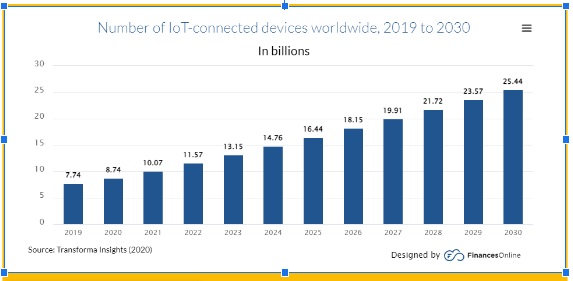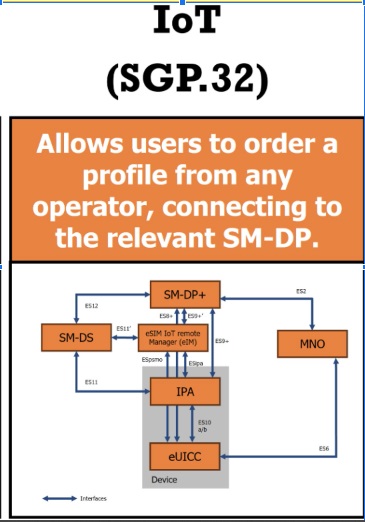Effortless
- Effortless Communication: Reliable Digital
- landline with Crystal Clear Calls and Advanced Features.

Check this Resurgence In IoT Technology: Unveiled by the GSMA SGP.32 Standard!
The IoT technology and other types of mobile accessories deployments are set to witness a transformative change with the introduction of the GSMA SGP.32 standard. This groundbreaking approach is designed for remote eSIM management for IoT devices and mobile accessories deployments. This has shown promising growth and innovation in a new era of connectivity and efficiency for the telecommunications and IoT industries.
In May 2023, the GSMA unveiled the SGP.32 standard as the latest third addition to the eSIM Remote SIM Provisioning specifications (eUICC). This much-anticipated GSMA SGP.32 standard third variant is a simplified IoT profile assistant designed for eSIM IoT architecture. Which aims to address the limitations of its predecessors – the SGP.02 (M2M) and SGP.22 (Consumer) versions.
This GSMA SGP.32 eSIM technology is now redefining the landscape of IoT connectivity. It offers solutions to the complexities and inflexibilities that have hampered the eSIM Remote SIM Provisioning standards in IoT deployments.
What is SGP 32?
GSMA SGP. 32 is the standard technical architecture conforming to eSIM remote provisioning specifications used for IPv6-based IoT infrastructures. That has a low bit rate, high packet loss, and eUICC in the IoT network-resource-constrained or constraint-based interface.
According to Exploding Topics’ analysis of IoT Statistics, there are around 14.76 billion connected IoT devices globally. The number is projected to exceed over 25 billion within the next six years. (Finance Online)

The emergence of eSIM technology was expected to fuel the expansion of IoT adoption and predict revenue streams at a relatively low cost in the connected devices market.
However, existing eSIM remote provisioning standards have posed challenges by making IoT deployments complex and inflexible, which prevents major enterprise projects from developing the IoT markets.
Following the eSIM technology and its standards provides valuable insight into the significance of the GSMA SGP.32 standard. GSMA eSIM standard discovery aims to streamline connectivity management for mobile devices and eliminate physical SIM card swap technical hurdles. It allows embedded over-the-air profile management for seamless activation of eUICC-capable SIMs to manage embedded SIM cards and hosts operator de-facto standard profiles mechanism.
This shift from traditional SIM card processes helps with boring and rigid SIM network partners in lock provider agreements processes. Thereby, it reduces expenses and manual installation hurdles.
What is eSIM IoT Architecture?
The GSMA has drafted remote SIM provisioning for eSIM technology standards, which enable various types of mobile devices, including GSMA eSIM compliance, SGP.21 eSIM Consumer Architecture Specification, and now, eSIM for IoT devices (Dec 11, 2023).
Although all three specifications use Remote SIM Provisioning models, each presents unique processes tailored to the specific device type and produces a harmonised yet customised approach to remote provisioning.

Since GSMA released SGP.32, the technical specification of the new eSIM IoT standard marks a remote provisioning standard for IoT devices for the industry outlines. With the published SGP.31 eSIM IoT Architecture and Requirements preceding the release of SGP.32, the whole industry has been standing by for the GSMA to release SGP.32.
The introduction of SGP.32 on 26th May 2023 represents an achievement of something quick for eSIM technology in the domain of Massive IoT. That empowers device manufacturers to capitalise on the new standard and scale their IoT projects with new standards and efficiency.
The Need for a New Approach To Redefining eSIM Standards!
For eSIM remote provisioning, two standardised specifications have been leading the way: GSMA’s Embedded Machine-to-Machine Industrial eSIM Standard (M2M) and the multiple operator profiles Consumer eSIM Standard.
These standards were designed to provide specific device types and user scenarios. However, as the industry grew, SGP.31 eSIM IoT Architecture became increasingly dependent. Industries have expected a new business model and tailored approaches to address the limitations and inherent complexities in the existing eSIM standards.
Let’s check out the M2M standard, which caters to IoT devices operating without a user interface.
This M2M architecture includes essential components such as the eUICC (eSIM) in the device, Subscription Manager – Data Preparation (SM-DP) that is a unique code identifier for a remote server for easy download and operation eSIMs, and Subscription Manager – Secure Routing (SM-SR) modules that are securely delivered encrypted operator by easy managing eUICC profiles. So, businesses now prefer the global cheapest M2M SIM card services.
While the M2M standard served its purpose, it also brought forth significant downsides that impeded its widespread applicability.
One of the primary drawbacks of the M2M specification is its operator-centric nature, where the operator sets up profile ordering and eSIM management platform operations.
This results in a complex integration process between different operators’ SM-DP and SM-SR servers and makes profile switching between operators a formidable challenge.
Additionally, the inflexibility of the M2M standard often leads to situations such as SM-SR lock-in. Thereby complexity and legal barriers make it difficult for devices to switch between operators, which causes a significant challenge for businesses and IoT deployments.
On the other hand, the Consumer eSIM Standard is tailored for user devices like smartphones and tablets. This simplifies eSIM profile management by taking only user consent to add or switch profiles anytime and anywhere.
Conclusion:
After the introduction of SGP.32, the industry can expect to witness a transformative shift towards seamless, flexible, and user-friendly eSIM as central management systems for IoT devices.
This new IoT M2M SIM card standard aims to streamline uninterrupted connectivity management, address connectivity issues by eliminating complexities, and allow businesses to scale their IoT projects with unique efficiency.
The arrival of the SGP.32 standard signals in eSIM technology set a new chapter in the telecommunication landscape that promises a future where IoT connectivity is redefined. Zoiko Telecom‘s IoT M2M SIM card sets your business scalability and accessibility in communications innovation and successful growth in large-scale deployments.
As the UK’s leading M2M SIM card provider, we make it accessible to the cheapest M2M SIM card service that could easily be streamlined and simplify the integration process into the eSIM M2M specification.
Check our cheapest M2M SIM card plans for your business today.




